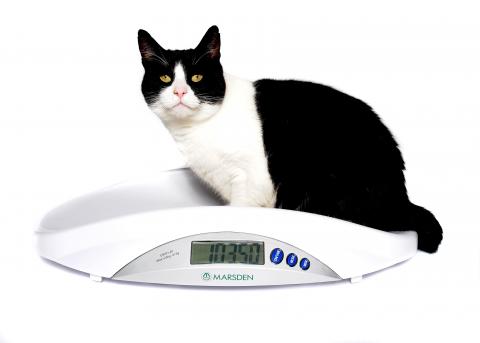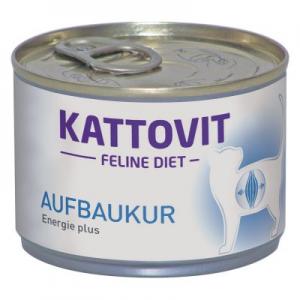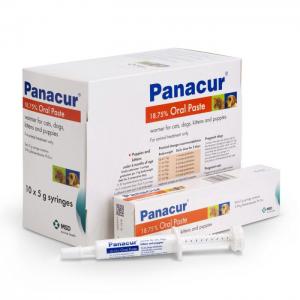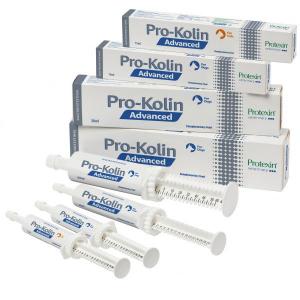Cats and kittens can be underweight or simply fail to thrive for a number of reasons. Learn how to make a cat gain weight.

Usually, people who want to know how to make a cat gain weight have a cat that falls into one of these categories:
One: a kitten, under the age of one, who is growing very slowly and not gaining much weight at all
Two: a cat or kitten who suddenly loses weight quickly, often as a result of an illness or after surgery
Three: an older cat who has lost weight over time
This article is really focused on those cats and kittens who are failing to thrive, meaning that they are either not gaining weight as they should or are very gradually losing weight. If your cat loses weight very rapidly, this is a medical emergency and you need to see your vet immediately. Rapid weight loss in cats can lead to hepatic lipidosis which can be fatal. Equally, if your cat is exhibiting any symptoms of serious illness, such as diarrhea, sickness, vomiting or change in personality, that is also a medical emergency and you must see your vet immediately.
Failure to thrive: how to make your cat gain weight
If you have a cat who is slender and is not gaining weight, or a kitten above the age of 8 weeks who is small or not gaining weight, then it is important to identify the cause of the failure to thrive.
It is very distressing for new kitten owners to collect their kitten from a breeder or cat rescue, and only later realise that their kitten is very tiny. A very small kitten is a concern, because good weight gain is an indicator of good health. A slow growing kitten does not necessarily mean that the kitten is unwell, but it does usually mean that something is not quite right. Please note that this section deals with kittens from around 2 months old. Very young kittens who are still nursing, are a different matter and will not be dealt with here.
Equally an adult cat who is very gradually losing weight is a real concern too, and the situation needs to be remedied as soon as possible.
How to make a cat gain weight: General advice
Identifying the cause of a failure to grow properly is very important. But no matter what the cause of a slow growing cat or kitten, there are some things you can do that are always helpful:
-
Monitor your cat’s food intake as best you can. This does not have to be a science experiment with every gram recorded, but just make sure you notice how much your cat is eating. If your cat is eating sufficient food, and not gaining weight, then this will help you narrow down the potential causes of the lack of growth
-
Weigh your cat or kitten at least once a week, and record their weight so you can track it
-
Consider adding some dry food to your cat's diet. Because dry cat food does not have moisture in it, it has more calories per gram than wet cat food, and more nutrients per gram. Try sprinkling a high quality dry cat food on top of your cat's wet food.
-
Switch to a high calorie, complete cat food. There are some high calorie foods on the market that are not complete cat foods. This means that they do not have all of the nutrients that cats need to develop properly, and therefore are not suitable for kittens, pregnant cats, or as a long term diet for any cat.
-
Hills Restorative Care a/d is a high calorie food for cats and dogs. It is designed to be super-delicious and is packed with calories BUT it is not a complete food. So it is ok to use it as an emergency food to get your cat eating, or as a high calorie supplement, but not as a sole food long term. This food is so yummy that all of our cats wolf it down, even if they've already had dinner! We always have some of this in the cupboard, just in case we need it. It is great for fussy cats or any time you just need to get some calories in your cat. Also good for new kittens who may be too nervous to eat for a few days - pop this down in front of them and it will likely be enough to get them eating.
-
Buy a pack of 12 Hills Restorative Care a/d on Amazon (#affiliatelink)
-
Buy a pack of 24 Hills Restorative Care on a/d on Amazon (#affiliatelink)
-
-
Kattovit Convalescence High Energy cat food is a high calorie cat food that is a complete cat food. It is therefore suitable for cats, kittens, pregnant cats and as a longer term diet. This food has around 120 calories/100 grams of cat food. Most wet cat foods have around 80 calories/100 grams of cat food, so this food provides around 50% more calories per 100 grams. The downside with this food is that it only has 300mg/kg of taurine. It is estimated that cats need more like 2,000mg/kg of taurine. As a short to medium term food this would be ok, but if you are going to use it longer term, we would suggest supplementing it with taurine or a more complete food.
-
Read our wet cat food reviews and dry cat food reviews for more ideas
-

Please remember that any time you switch your cat onto a new food, you should do it very gradually. Mix a little bit of the new food in with your cat's old food, and increase the amount over about 2 weeks until you have completed the switch. The only exception to this is if your cat will not eat her current food, in which case you can just try her on new foods to see if she prefers them.
Now we will look at the most common causes of a cat or kitten failing to gain weight, and the best solutions as to how to make a cat gain weight in each scenario:
How to make a cat gain weight: Underfeeding
Unfortunately young kittens are often underfed by their breeders or cat rescues. This is not necessarily an attempt to save money (although it can be!). Sometimes a smaller kitten will be pushed to the side by his or her siblings, or not tended to as well by his mum. Equally, a cat in a multi cat household can often get pushed to one side by his cat housemates. The solution to this is quite simple: you simply have to make sure that the cat or kitten gets enough food. If you are a single cat household this is easy - just give your cat his food, and keep an eye on how much he eats. Weigh him every day, or at least once a week to make sure that he is gaining weight. In a multicat household separate him from the other cats to feed him. If he is eating and not gaining weight, then you know that there is another cause.
Dislike or boredom of food
Cats are fussy creatures. You would think that a cat who gets hungry enough will eat anything eventually. Think again! Cats are strong minded, independent and know their own mind! Keep an eye on your cat or kitten and note how much they actually eat. If they simply sniff at their food, give it a few licks and then walk away, then it is possible they simply don’t like the food. To make food more attractive, you can try mushing it up a little, or warming it ever so slightly in the microwave. You do not want the food to be hot - you are just warming it enough to increase the aroma of the food. Cats are very driven by smell, so the better the food smells, the more likely they are to eat it. If they still won’t eat it then try them on a different food. If you need to, give him a little bit of tuna or fresh, steamed chicken shredded up. Tuna and chicken do not have the nutrients in that cats need to survive, so you cannot use them as a long term diet, but they are a very good way of getting your cat into the habit of eating.
How to make a cat gain weight: Depression
A depressed cat might stop eating. A depressed cat will often appear lethargic and withdrawn. If your cat is depressed you need to enrich his environment. See our article on environmental enrichment.
How to make a cat gain weight: Parasites

One of the most common causes of kittens and cats not gaining weight is parasites. There are a variety of parasites that can cause slow growth in kittens. Most cause no other symptoms at all, but some like Giardia or Tritich can cause mild to very severe diarrhea. If your cat is eating well, and is still not gaining any weight, then it is likely that she has parasites. If she has no other symptoms and is a healthy cat, try worming her with something like Panacur paste. If, however, she has diarrhea, sickness or any other symptoms of illness then take her straight to the vet. Wormers are quite harsh chemicals and not a good thing to use on sick cats. If a cat is sick, the last thing we want to do is put more strain on their systems. Use a good quality wormer, and repeat regularly and as directed. If the wormer is working, your cat should start to gain weight within a week of treatment. Keep a record of what your cat is eating and weigh her at least once a week. Worming is usually a good answer to the question of how to make a cat gain weight.
How to make a cat gain weight: Viruses
The most common virus that can cause a failure to thrive is Feline Coronavirus or other viruses. Feline Coronavirus is essentially a tummy bug for cats, like Norovirus for humans. It causes mild to moderate diarrhea in cats. There is no treatment for Coronavirus, but there are things you can do to help your cat recover as quickly as possible. This is discussed further in our article on Feline Coronavirus, which is well worth a read. A cat with diarrhea may well not have much of an appetite as they are feeling poorly. Prokolin Advanced for cats is a good solution for calming diarrhea. It contains probiotics that help aid and calm digestion which can make your cat feel better and therefore likely to have a more normal appetite.
Protexin Pro-kolin Probiotic is very useful if a cat has diarrhea. Buy Pro-kolin on Amazon here (#affiliatelink)

Bacterial infection
Bacterial infections like Campylobacter and E-coli can affect cats and humans. Be very careful if your cat has one of these, because you can catch it from them, and they can be very serious in humans. If you suspect your cat has a bacterial infection you will need to take him to the vet. Only a vet can test for and confirm what bacteria is causing the problem, and your cat will need an antibiotic that is specifically for that bacteria. Symptoms could include smelly diarrhea, general lack of energy and slow growth. As above, try ProKolin to calm your cat's digestion. Buy Pro-kolin on Amazon here (#affiliatelink)
How to make a cat gain weight: Dwarfism
Dwarfism is a very rare condition in cats, but it does occur. Dwarf cats have tend to have skeletal problems, including shorter legs. Your vet can do a hormone test to confirm if your cat has dwarfism.
How to make a cat gain weight: Serious illness
Usually a serious illness causing a lack of growth or weight loss would be accompanied by other symptoms. If your cat loses weight rapidly, take him immediately to a vet - it can be an emergency. If your cat has diarrhea, loses her appetite, is vomiting, feverish or has any change in his personality, take him immediately to the vet. Liver disease, kidney disease, cancer, pancreatitis and many other serious illnesses can all cause a cat to lose weight.
If none of these options seem to fit with your cat's weight loss or failure to thrive, please contact your vet. Your vet should be able to help you answer the question of how to make a cat gain weight.
As an Amazon Associate we earn from qualifying purchases. We only review and endorse products that we use ourselves and recommend.
Read more...
- how often should I vaccinate my cat?
- FIP
We are expert breeders of British Shorthair kittens, based near Chester and Wrexham in the North West. See if we have any kittens available! As an Amazon Associate we earn from qualifying purchases. We only review and endorse products that we use ourselves.